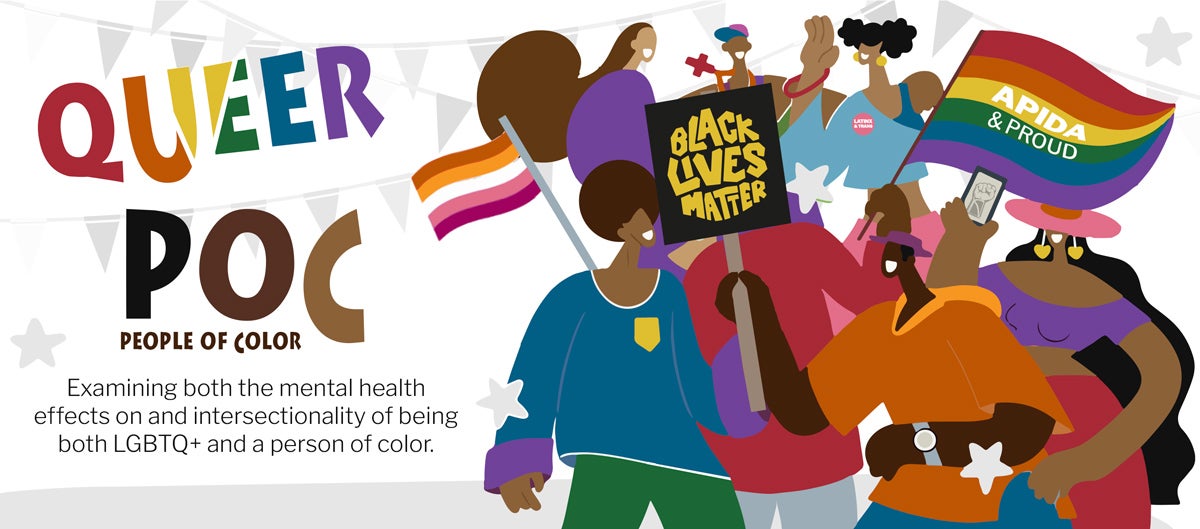
As stated last week in the Power of Being Out, we understand too well that the health and well-being of LGBTQ+/queer individuals must be a priority. The intersection of being queer with being a person of color (POC) exposes a person to unique stressors and threats to well-being. In 2017, the Journal of Gay & Lesbian Mental Health released a special issue on Mental Health and LGBTQ People of Color. In it, we learn that being a multiple minority in times of increasing bigotry, policy changes, and other structural oppressions causes undue stress and leads to poor mental and physical health outcomes.
But just as queer POC face unique stressors and forms of structural oppression, they have also pioneered unique forms of resilience and community. Following our recent blog post on the Power of Being Out, in which we sought out the voices of queer people to hear their stories, this week we are asking queer people of color additional questions regarding their unique intersectionality, their queer identity in their race community, and their racial identity within the queer community.
Tracy Y. Jennings
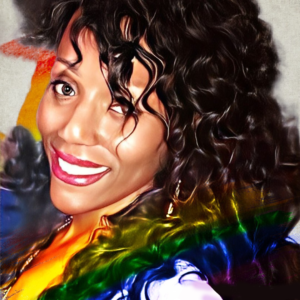 We spoke with Tracy last week about her power in being out. Now, we are discussing her intersectionality of being both Black and lesbian.
We spoke with Tracy last week about her power in being out. Now, we are discussing her intersectionality of being both Black and lesbian.
Growing up, Tracy was fairly sheltered and spent much of her time figuring out what she enjoyed in life. In being out as her true self she says “I feel that I am more outspoken about my wants and needs in life. Growing up, I didn’t have a voice. I was shy and afraid to speak up. Now as an adult, I have the freedom to speak my mind and not be afraid of the consequences. I am living the life I want for myself and I am continuing to learn more about what I need for myself.”
As a high school student in the late 1990s she and others around her were generally afraid to be out and be themselves. Tracy came out her senior year. In being out she feels “accepted across the board.” And has “become more outspoken about who I am and what I want.” She continued, “The moment I learned my voice and accepted Tracy, the rest is history.”
We ended by asking if she had any insights to share. She replied “Love who you want to love and be yourself! God created EACH AND EVERY ONE OF US!!! Accept yourself and love yourself. We all have flaws. Be sure to make them beautiful.”
Donald “DJ” Johnson, Jr.
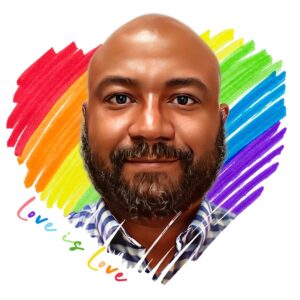 DJ works as a special education teacher and as a Special Olympics coach. While continuing his education towards a PhD, his life’s purpose is to educate others to be productive members of society and help them procure the tools they need to succeed. However, being out as his true self has had both positive and negative impacts on his mental health and well-being.
DJ works as a special education teacher and as a Special Olympics coach. While continuing his education towards a PhD, his life’s purpose is to educate others to be productive members of society and help them procure the tools they need to succeed. However, being out as his true self has had both positive and negative impacts on his mental health and well-being.
Within the Black community, he says “While I can be/act/portray myself as the person I want to be, not being fully accepted by other Black people has left a sour taste in my mouth. I have to deal with some pretty disrespectful homophobia from them – even though we have a shared experience with the same racial struggles with members of other races – especially as a Black man married to a white man.” In addition, he continued “I feel very alone – like I am an outsider.”
He also said that “While it is liberating to finally be able to live your truth, there may be times when you must be strong enough to live your truth by yourself. I have had long-time coworkers come to me and thank me for being myself because they felt a certain way about the LGBTQ+ community and getting to know me has helped them become more open-minded about the community.”
In addition to his teaching and Special Olympic duties, DJ has been a part of the non-profit Imperial Court System for the past eight years. The organization holds fundraising events such as drag shows, bake sales, and dinners to help raise funds for other non-profit organizations. When asked how this organization has helped empower him, he says “By the time I became Emperor of my chapter, I was known for my performances by many in the different chapters of the United States. But I would still get hate about my dancing. Even though it sucked, I leaned into my blackness and made sure to use my platform to draw attention to the lack of people of color (POC) members in the organization and continued to be unapologetically Black at every chance I got. I have faced quite a bit of racism from POC and non-POC members of the LGBTQ+ community for not living up to their idea of what a gay Black man should be.” Finally, we asked him if there’s any part of his journey he would do differently, he said “While for the most part I’m happy with my current life, I wish I could see what I could have achieved if I put forth more effort there instead of failing out and having to find another route to my success.”
Vaibhav Jain
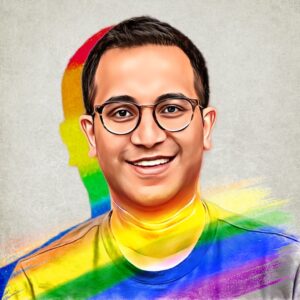 Vaibhav was born and raised in New Delhi, India. He’s a cisgender gay man and LGBTQ+ advocate who works as the national outreach director at the AAPI Victory Fund.
Vaibhav was born and raised in New Delhi, India. He’s a cisgender gay man and LGBTQ+ advocate who works as the national outreach director at the AAPI Victory Fund.
A public health specialist, graphic designer, and consummate organizer, Vaibhav began his career as a community health dentist in small villages across southern India. That experience inspired him to seek systemic change which advances equity and opportunity for marginalized populations. Over the past decade, Vaibhav has worked for universities, think tanks, advocacy, and intergovernmental organizations.
When we asked Vaibhav how being out changed his life, he answered, “Coming out to my parents and family in 2013 was liberating. I slept better. I walked taller. I breathed easier. However, it did not do away with the anxiety and depression that has been a part of my life for decades. What coming out taught me was that I have the love, the support, the tools, and the self-worth to get the treatment I need in order to survive, thrive, and strive for better.”
Asked how coming out as gay affected him in the South Asian and Indian communities, Vaibhav answered, “When my husband Parag and I got married, stories, photos and videos of our wedding ceremony went viral around the world, including my homeland of India. Our story as a same-sex bi-national couple and the acceptance of our families touched a nerve with millions. I was flooded with private messages from complete strangers – many of whom wanted to speak with me in Hindi. This made me realize that while there continues to be a lot of prejudice against homosexuality in my culture, there is also a significant need for linguistically accessible and culturally competent education about sexual orientation and gender identity.”
Vaibhav continues, “In 2020, my husband and I filed a petition before the Delhi High Court (the second highest judicial body in India). We are seeking recognition of our marriage under existing Indian law. If successful, our case and several others like it could lead to marriage equality for nearly 1.4 billion people. To put that in context, the total global population currently living in a place where same-sex marriage is recognized, is 1.2 billion. Our cases could more than double that.”
Coming out for Vaibhav was “incredibly validating. My honesty and candor were rewarded with overwhelming support and validation from the people who matter to me the most. I learned from being gay that I have the strength and courage to be my complete self. I learned that I am enough.”
Vaibhan’s final words of wisdom for our readers: “Living a lie and living in the shadows is exhausting, it is corrosive, and it takes a toll on your physical and mental health. I would never pressure anyone to come out about their sexual orientation, gender identity, or mental health status. That is a deeply personal decision that everyone has to make for themself. However, I do counsel others to live their authentic lives free from stigma and fear whenever they are safe and secure enough to do so. As the saying goes, “ye shall know the truth, and the truth will make you free.”
Deonna Reese-White, MD, MBA
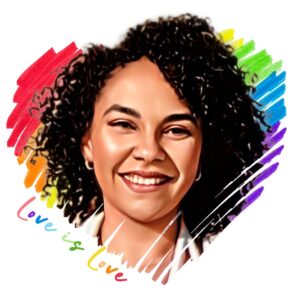 Dr. Reese-White, a neurologist, is a Black queer woman. Currently a resident at Dell Medical School, she worked as a high school science teacher before becoming an MD. She grew up in upstate New York and received her Bachelor of Science in Psychology and Master of Science in Science and Technology Studies from Rensselaer Polytechnic Institute.
Dr. Reese-White, a neurologist, is a Black queer woman. Currently a resident at Dell Medical School, she worked as a high school science teacher before becoming an MD. She grew up in upstate New York and received her Bachelor of Science in Psychology and Master of Science in Science and Technology Studies from Rensselaer Polytechnic Institute.
She says “As a teacher, I made the decision to be fully out and proud at my workplace and in my daily life. I wanted my wife (then girlfriend) to be able to attend school events, help me set up my classroom, etc. all without the feeling of being closeted. I also wanted to be an example and safe person for my students who identify as LGBTQ+. Making the commitment to myself to try, despite fear of backlash, was hard but the best decision I could have made for myself and my family. It helped me build my confidence to live authentically moving forward. Being out meant I didn’t have to hide my identity which gave me the ability to have a social support system. There was also the lightening of the burden and mentally taxing act of code-switching. “
Continuing, Deonna says, “My experience identifying as a queer woman within the Black community has been difficult at times. Religion is a cornerstone for many Black communities, especially Black communities in the South, and the teachings at many Black churches are quite homophobic. Having grown up in the Black church, when I left for college, I also left the church. My community prior to that was my church family and now I was tasked with finding a new community at a predominantly white and male institution. This without a doubt played a role in my mental health struggles during my first year of college.”
Adding that “I feel that many of my former students [now] look to me as a mentor and role model. I believe it is important to be visible for the youth coming up so they can see people who have similar identities to them in spaces that have traditionally not been welcoming to underrepresented populations. And in positions of power.”
Regarding being a role model Deonna says, “I’ve mentored one young man who identifies as gay and is a POC for the past ten years and I have watched him come from difficult circumstances to obtaining his associate and bachelor’s degrees despite all of the odds stacked against him. I’ve just recently written him a letter of recommendation for business school.”
In addition to being a role model to LGBTQ+ youth, when looking back, “I found my being out had an impact on teachers in the school who also identified as LGBTQ+ but were not out for a variety of reasons. They began to share their identities and to invite their partners to school functions.”
From everyone at the Hogg Foundation, we would like to thank our contributors for being so honest and open about the power they find in being out as LGBTQ+ and a person of color.
